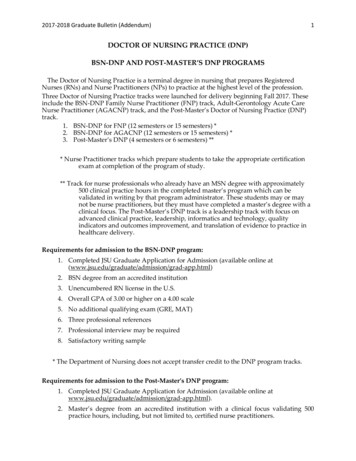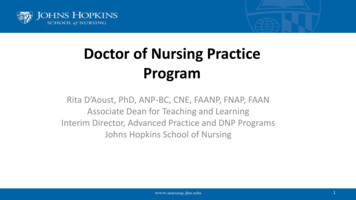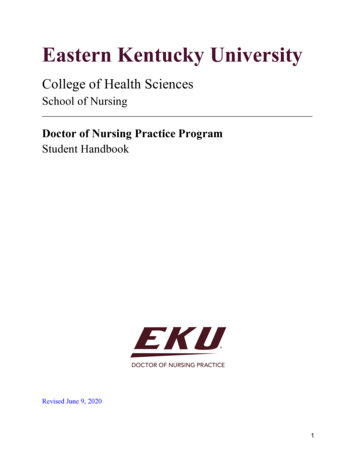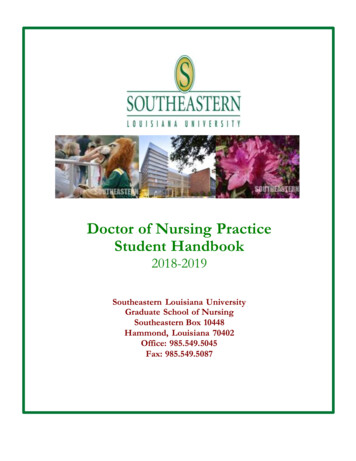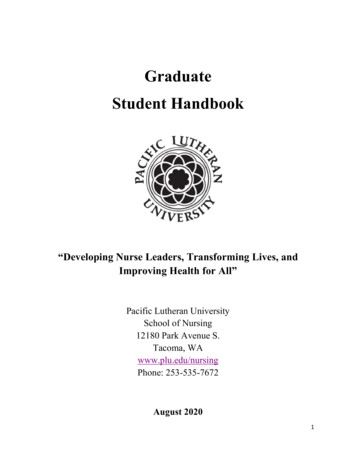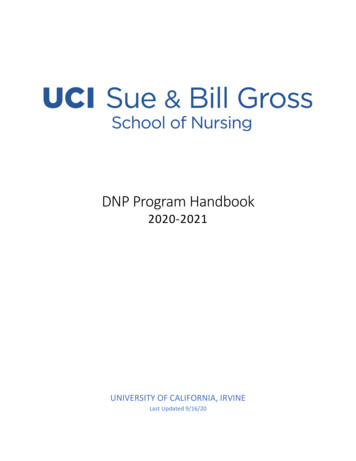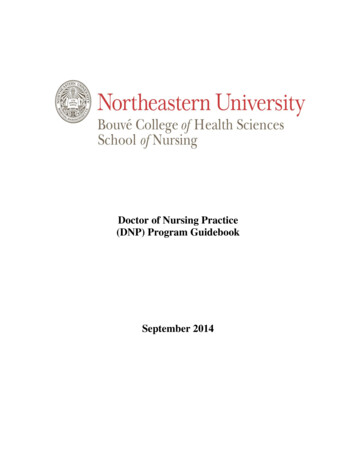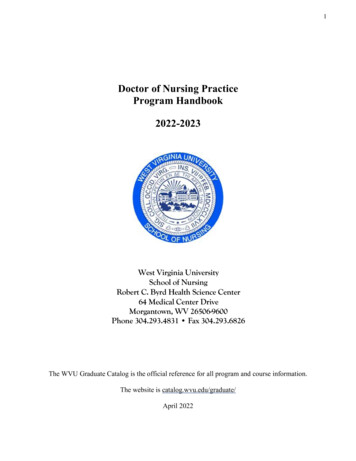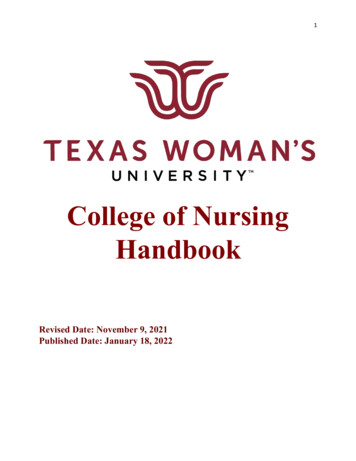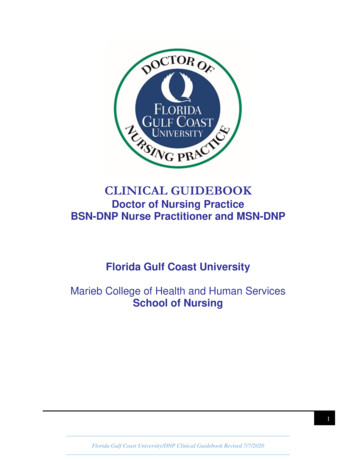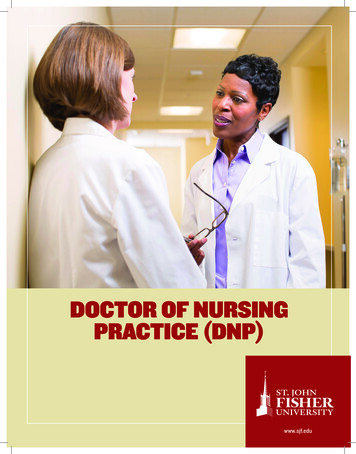
Transcription
DOCTOR OF NURSINGPRACTICE (DNP)-1-www.sjf.edu
WELCOMEThe Wegmans School of Nursing at St. John Fisher University prepares its graduates topractice in increasingly complex, diverse, economically challenged, and research-basedhealth care organizations. The science of nursing practice is enhanced at Fisher by thevalues-based education that is rooted in the educational philosophy of the BasilianFathers. This is the tradition at Fisher and the model of education that best servesnursing professionals practicing in a world of challenges and discovery. The Doctorof Nursing Practice (DNP) program at the Wegmans School of Nursing continues thiseducational mission and tradition through the preparation of advanced practice nurseswho will provide expert patient care, assume health care leadership roles, and evolve“The DNP is the ultimateclinically practice focuseddegree awarded to nurses whoadvanced nursing practice in response to society’s changing needs.The format of the DNP program includes an innovative structural design created tomeet the needs of practicing nurses. Instructional activities include blended hybridhave aspirations of translatingcourses, the integration of technology throughout the coursework, and the use ofevidence-based care intosimulation, case studies, and seminars. We expect that our graduates will make majorpractice, improving systems ofcare, and measuring outcomesof groups of patients andcommunities. Our DNPgraduates are prepared tocontributions in the fields of advanced practice, clinical scholarship, and leadership inhealth care organizations. We welcome the opportunity to discuss our program withyou. If you have any questions, please contact the Office of Admissions at grad@sjf.eduor call (585) 385-8064.Sincerely,effect change and take onTricia K. Gatlin, Ph.D., RN, CNEhigh-level roles in healthDean, Wegmans School of Nursingsystems, academia, and policymaking, with the goal ofOVERVIEWimproving health outcomesfor individuals, communities,and the nation as a whole.”The DNP program is a rigorous advanced practice clinical doctorate which reflects theevolution and development of professional nursing. The program has two entrance points.Students who have completed a bachelor’s degree in nursing may enter at the postbaccalaureate program. As part of the post-baccalaureate program, students will be prepared— Tricia K. Gatlinas either a nurse practitioner or clinical nurse specialist. The post-baccalaureate entryDean, Wegmans School of Nursingprogram is a minimum of 62 credits and three years of full-time study. Students interestedin the post-baccalaureate program should consult the admission criteria for the master’sprogram in nursing.Those students who have a master’s degree in nursing and advanced specialization as anurse practitioner, clinical nurse specialist, nurse midwife, or nurse anesthetist may enterthe post-master’s program. The post-master’s entry program is a 33-credit, two-year programof full-time study.
PURPOSE, PROGRAM OUTCOMES, AND GOALSPURPOSEThe purpose of the DNP program is to prepare the graduate as an expert clinician for direct or indirect care roles in advanced practiceand in clinical leadership.PROGRAM OUTCOMESAt the completion of the program, the student will enact the following outcomes: Implement and evaluate clinical practice based on scientific knowledge. Assume advanced practice nursing roles as an expert clinician. Demonstrate advanced leadership skills necessary to meet the challenges of increasingly complex health care organizations. Demonstrate analytical methodologies for the evaluation of clinical practice and the application of scientific evidence toimprove professional practice. Apply clinical scholarship methodologies for organizational quality improvement, evidence-based practice, and health careoutcomes. Use advanced skills to design, develop, and implement the use of contemporary technological information systems. Demonstrate expertise in the analysis, formulation, and implementation of health care policy. Collaborate with interdisciplinary teams necessary to meet health care needs of individuals and populations. Apply ethical theories, legal and practice standards, and advocacy to decision-making in health care issues. Apply population-based methodologies for health promotion and disease prevention in advanced practice.GOALSThe goals of the program are to: Provide a high-quality educational program that prepares candidates for successful careers as clinical experts and leaders. Implement a program of study that promotes expert clinical practice, continuous practice improvement, effective leadershippractices, and clinical scholarship. Participate in the evolution, development, and improvement of clinical practice for professional nursing. Create and implement a rigorous clinically focused doctoral program which demonstrates the continuous improvement ofclinical practice and scholarship. Impact and improve clinical practice, clinical outcomes, health policy, and care delivery methodologies.DOCTOR OF NURSING PRACTICE BY THE NUMBERS2PROGRAMENTRY POINTS5POST-BACCALAUREATEOPTIONS1FISHERFAMILY
PROGRAM DESIGNDEGREE REQUIREMENTSThe DNP program provides both full- and part-time options forPOST-MASTER’S REQUIREMENTSstudy. Courses are held on weekday evenings during the fall, spring,and summer semesters. A student who chooses the full-time optioncan complete the 33-credit-hour post-master’s program in sixsemesters. A part-time student who takes two courses per semestercan complete the post-master’s program in seven semesters.Post-master’s candidates are required to: Successfully complete a minimum of 33 credit hours. uccessfully complete 1,000 hours of clinicalSscholarship. Master’s advanced practice clinicalhours will count toward the 1,000 hours. Successfully complete a DNP project.It is expected that each DNP student will complete a minimum of1,000 hours of clinical practice in accordance with the AmericanAssociation of Colleges of Nursing’s “DNP Roadmap Task ForceReport” (2006). For the post-master’s student, coursework inthe program will provide the additional clinical practice hours,building upon the practice hours that were part of the student’smaster’s degree, to meet the 1,000-hour requirement. For thepost-baccalaureate student, the 1,000 clinical practice hours willPOST-BACCALAUREATE REQUIREMENTSPost-baccalaureate candidates are required to: be completed within the program.Clinical placements will occur in interdisciplinary settings withan expert clinical scholar/mentor. Each setting will providestudents with extensive advanced clinical practice experiencesand allow the students the opportunity to implement emergingscience and practice innovations to improve the health caresystem.Each student will undertake a DNP project supported by scholarlyevidence reflecting a practice site and population of interest. Thestudent will appoint a DNP Committee in collaboration with theGraduate Program Chair. The DNP Committee and the DNP Adult/Gerontology Primary Care NursePractitioner Adult/Gerontology Acute Care NursePractitioner Adult/Gerontology Clinical Nurse Specialist Primary Care Family Nurse Practitioner Psychiatric Mental Health Nurse Practitioner uccessfully complete 1,000 hours of clinicalSscholarship. Successfully complete a DNP project.Project Handbook will support the successful completion of thisdoctoral project. There is no dissertation requirement.Successfully complete 62-72 credit hours. Candidatesshould meet with their faculty advisor to discussspecific degree requirements. Credit hours includecourses in one of the following advanced practice roles:
CURRICULUMFor information about the curriculum and/or detailed course descriptions,please refer to the Graduate Catalog at http://go.sjf.edu/graduate-catalog.ADMISSION TO THE PROGRAMThe Doctor of Nursing Practice program operates on a rolling admissions basis.Applications are reviewed as they are received and admissions decisions aremade within four weeks of receipt of a completed application.For more information about the admissions process, including specificapplication requirements, visit http://go.sjf.edu/dnp-application or call theOffice of Admissions at (585) 385-8064.FINANCIAL AIDStudents applying for federal financial aid may do so at www.fafsa.ed.gov.Information is available at http://studentaid.ed.gov.The FAFSA code for St. John Fisher University is 002821.For more information about financing the doctoral program, prospectivecandidates should contact the Office of Student Financial Services at (585) 3858042 or finaid@sjf.edu.Students are encouraged to apply for financial aid as soon as possible.WHERE DO OURGRADUATES GO?As a graduate of the DNP program at theWegmans School of Nursing, you will gainmore than an advanced professional nursingtitle; you will be known as a Fisher nurse –an elite group.Our graduates practice in a variety of healthcare settings at the local, regional, andnational levels.
ABOUT THE WEGMANS SCHOOLOF NURSINGThe Wegmans School of Nursing builds on Fisher’s values-basededucation to produce nursing graduates trained to provide exceptionalpatient care.Program offerings include the traditional nursing and RN to BSN onlineprograms at the undergraduate level, master’s programs in nursingand mental health counseling, and a Doctor of Nursing Practice (DNP)program.ACCREDITATIONThe baccalaureate, master’s, and DNP programs at St. John Fisher Universityare accredited by the Commission on Collegiate Nursing Education. TheWegmans School of Nursing is also accredited by the New York StateEducation Department.TAKE A CLOSER LOOKTo schedule an appointment, attend an Information Session, or observe aclass, call the Office of Admissions at (585) 385-8064 or visithttp://go.sjf.edu/graduate.
The DNP program is a rigorous advanced practice clinical doctorate which reflects the evolution and development of professional nursing. The program has two entrance points. Students who have completed a bachelor's degree in nursing may enter at the post-baccalaureate program. As part of the post-baccalaureate program, students will be prepared
